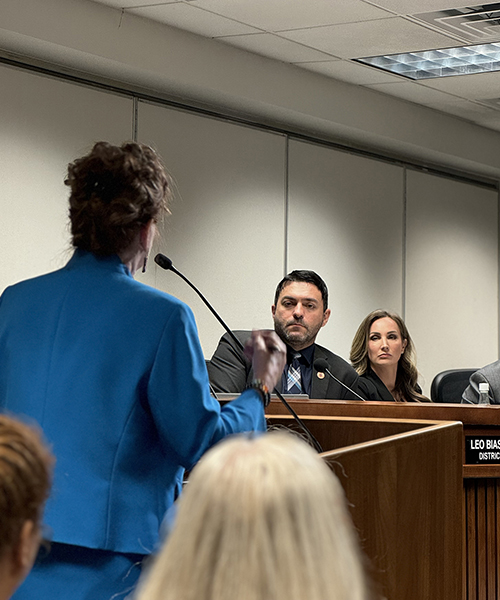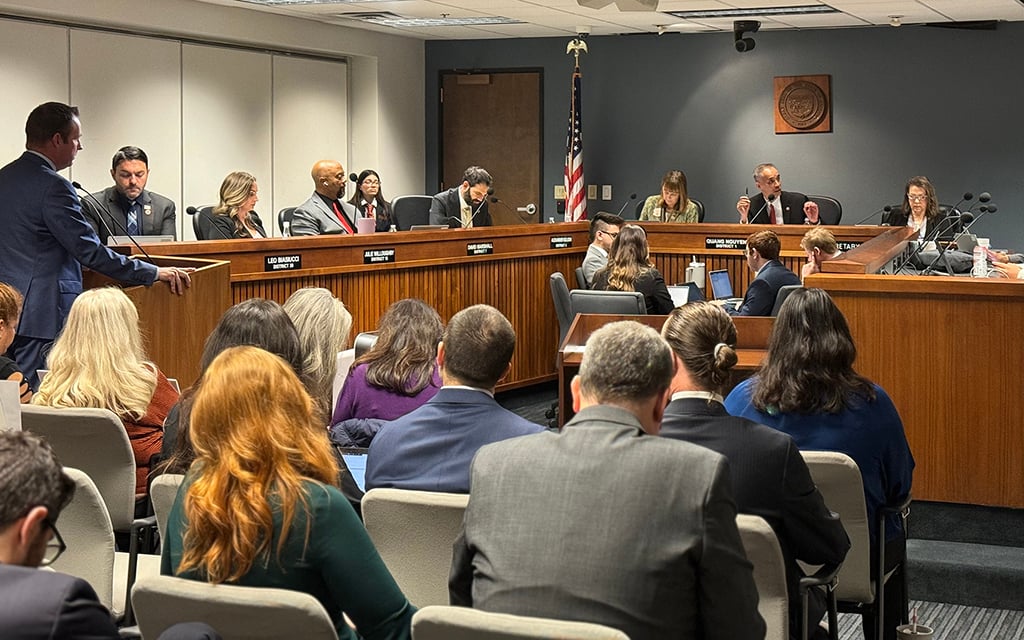PHOENIX – Teresa, now 16, testified about the late-night texts from her softball coach, his talk of drinking and losing his virginity and, eventually, the uncomfortable touching.
And how prosecutors later told her there was nothing they could do about it.
That’s why she and her parents turned out Wednesday for an emotional hearing on a proposal to make child “grooming” a crime.
Under current law, “the actions that occurred in my situation … are legal,” Teresa told the House Judiciary Committee, choking up at points during her testimony. It was the emotional highlight of a packed 90-minute hearing in which murmurs and occasional crying could be heard from the audience.
But opponents argued that there are laws in place to punish the coach for what he did, and the bill is unneeded.
“We disagree with the assertion that no law covers this behavior,” said Vicki Lopez, a defense attorney with Rosenstein Law Group. “Under the age of 15 is covered by all these statues, including attempted behavior under these statues.”
An attorney with Attorneys for Criminal Justice testified that the bill’s language was so broad and vague that it put innocent behaviors at risk for prosecution.

Vicki Lopez was one of two defense attorneys who testified against the grooming bill Wednesday, telling lawmakers that there are already laws on the books to punish predators, and that the bill’s language was so broad that it put innocent behaviors at risk for prosecution. (Photo by Martin Dreyfuss/Cronkite News)
But most of those at the hearing Wednesday were like Rep. Quang Nguyen, R-Prescott Valley, who called the current law “unacceptable.”
“Whether we do something with the bill or not, we need to do something with this. We need to get it out of committee,” said Nguyen, the chairman of the committee.
Nguyen is a co-sponsor of the bill, sponsored by Rep. Travis Grantham, R-Gilbert. It would make it a crime to “seduce, lure or entice” a minor to commit a sexual offense or distribute “photographs that depict a person’s sex organs.” Grooming would be a class 5 felony under the bill, but would be upgraded to the stiffer class 4 felony if the defendant “is in a position of trust.”
“This is not a political issue. This is not a joke. This happens to a lot of people, and there is no law or revised statute that makes this activity illegal,” Grantham said. “Politics is full of red herrings, I hope you can support this bill and help the victims.”
Even though they testified in a public forum, Cronkite News is declining to use the family’s name in this story because of the sensitivity of the subject.
Teresa related how her coach, over a two-year period, would send texts until 2 or 3 a.m., touch the bare skin of her leg and invite her to sit on a couch in his office, where he would lie on her. He told her stories how he lost his virginity, his drinking habits and how “a relationship in the future would not be a bad thing.”
Both of Teresa’s parents also testified. Her mother was in tears through much of the hearing, but she appeared angry when she testified about the family’s meeting with police and prosecutors.
She said police told them that because the coach did not touch any “hot zones” on her daughter, his actions did not constitute a sexual crime and were not aggravated assault because Teresa, then 13, “did not say no.”
“The best we have in the legal department said there is no statute to charge him with,” the mother said. “He said it was the worst grooming case he has seen in 35 years, but there is nothing they can do about that.”
Teresa’s dad said they were told the actions did not constitute stalking or harassment charges since they happened at school, which police told them is considered neutral ground.
“They have no ability to arrest or convict, so that individual is free to work with minors in the future,” the father said of the coach.
Rep. Leo Biasiucci, R- Lake Havasu City, pointed to the language in the current law, which he said excludes areas like “the thigh, buttocks, kissing” as the “hot zones” that could constitute a sexual crime. He said it is the committee’s duty to close those gaps in the current law.
Teresa agreed, saying her coach “toed the line but never crossed it. All I want to you to consider, is this action you want to condone?”
The committee adopted amendments that would increase the permissible age difference between a minor victim and defendant if they were no more than three years apart and the act was consensual – the so-called “Romeo and Juliet” language. Committee members voted 6-2 to send the bill to the full House for consideration.


